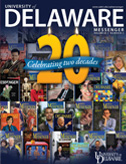Top award for sociologist who debunks conventional wisdom

ON THE GREEN | Joel Best, a professor of sociology and criminal justice who is widely regarded as a leading scholar in understanding the social construction of social problems, has been selected to receive the 2012 Francis Alison Faculty Award, the University's highest faculty honor.
Best's research, which includes 20 books, examines "how and why society becomes concerned with particular issues at particular moments in time." For example, he asks: Why do people worry about road rage one year and identity theft the next?
"Prof. Best is a well-rounded, highly prolific and accomplished scholar, and a most worthy addition to this eminent body of scholars," then Provost Tom Apple said in announcing the award. "He has made a remarkable impact on the field, on his students and on society as a whole."
George Watson, dean of the College of Arts and Sciences, says Best "models the rich and varied contributions that we encourage all faculty members to achieve—a world-class scholar, a devoted but demanding teacher, a committed mentor and an engaged member of the community."
In nominating Best for the award, a colleague said: "Whether it is his analysis of why people fall for fads and fashion, spotting dubious statistics or trends, or challenging the 'stupidity epidemic,' Joel's work debunks and demystifies the conventional wisdom to show both trained sociologists and the public that things are not as they seem with a simple, but elegant, brilliance."
Kirk Williams, professor and chair of the Department of Sociology and Criminal Justice, echoes those sentiments. "Few scholars have successfully blended social scientific acumen and the ability to transcend scientific jargon to inform the public," Williams says. "It is a true and rare skill, resulting in an illuminating discourse of remarkable research."
For Best, that's the goal.
After publishing a series of books beginning with Damned Lies and Statistics, which challenged numerous statistical claims and taught readers how to become critical consumers of quantitative information, he frequently received emails and requests from the media, parents, doctors, judges—and even Minnesota legislators.
"I like to think that what I'm doing is useful, that it's not ideas in an ivory tower," he says.
His two most recent books, The Stupidity Epidemic and Everyone's a Winner, have respectively examined warnings about education and school quality and the proliferation of awards and honors in contemporary America.
Best, who joined the UD faculty in 1999, is the author of 20 books (three of which are in their second edition and six of which have been translated into Chinese, German, Japanese, Korean or Spanish), 80-plus articles and more than 100 shorter pieces that have been cited nearly 4,000 times. In addition to his prolific scholarship, he has a strong history of mentorship, including the supervision of doctoral students, several of whom have written award-winning dissertations.
Article by Artika Rangan Casini, AS05





